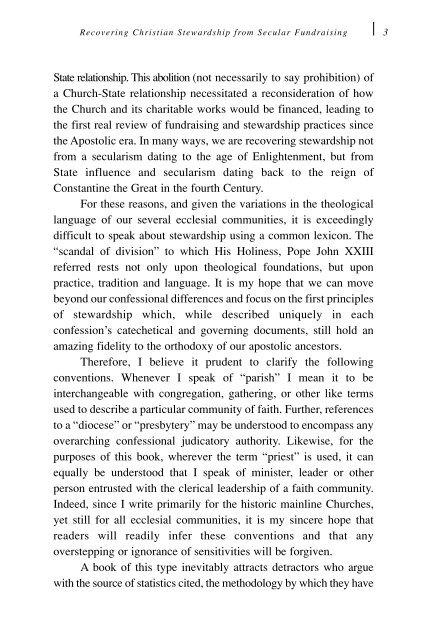Passionate Steward - 10th Anniversary Edition
10th Anniversary Edition of The Passionate Steward - Recovering Christian Stewardship from Secular Fundraising (St. Brigid Press - 2002).
10th Anniversary Edition of The Passionate Steward - Recovering Christian Stewardship from Secular Fundraising (St. Brigid Press - 2002).
Create successful ePaper yourself
Turn your PDF publications into a flip-book with our unique Google optimized e-Paper software.
Recovering Christian <strong>Steward</strong>ship from Secular Fundraising 3<br />
State relationship. This abolition (not necessarily to say prohibition) of<br />
a Church-State relationship necessitated a reconsideration of how<br />
the Church and its charitable works would be financed, leading to<br />
the first real review of fundraising and stewardship practices since<br />
the Apostolic era. In many ways, we are recovering stewardship not<br />
from a secularism dating to the age of Enlightenment, but from<br />
State influence and secularism dating back to the reign of<br />
Constantine the Great in the fourth Century.<br />
For these reasons, and given the variations in the theological<br />
language of our several ecclesial communities, it is exceedingly<br />
difficult to speak about stewardship using a common lexicon. The<br />
“scandal of division” to which His Holiness, Pope John XXIII<br />
referred rests not only upon theological foundations, but upon<br />
practice, tradition and language. It is my hope that we can move<br />
beyond our confessional differences and focus on the first principles<br />
of stewardship which, while described uniquely in each<br />
confession’s catechetical and governing documents, still hold an<br />
amazing fidelity to the orthodoxy of our apostolic ancestors.<br />
Therefore, I believe it prudent to clarify the following<br />
conventions. Whenever I speak of “parish” I mean it to be<br />
interchangeable with congregation, gathering, or other like terms<br />
used to describe a particular community of faith. Further, references<br />
to a “diocese” or “presbytery” may be understood to encompass any<br />
overarching confessional judicatory authority. Likewise, for the<br />
purposes of this book, wherever the term “priest” is used, it can<br />
equally be understood that I speak of minister, leader or other<br />
person entrusted with the clerical leadership of a faith community.<br />
Indeed, since I write primarily for the historic mainline Churches,<br />
yet still for all ecclesial communities, it is my sincere hope that<br />
readers will readily infer these conventions and that any<br />
overstepping or ignorance of sensitivities will be forgiven.<br />
A book of this type inevitably attracts detractors who argue<br />
with the source of statistics cited, the methodology by which they have




